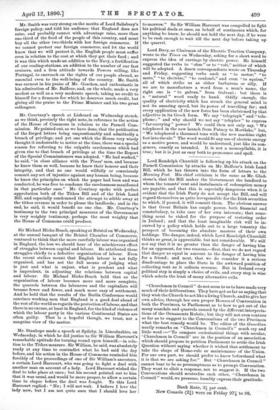Lord Bury, as Chairman of the Electric Traction Company, wrote
to the Times on Wednesday, asking for a short word to express the idea of carriage by electric power. He himself suggested the verbs to " ohm " or to "volt," neither of which will be adopted. A dozen correspondents wrote on Thursday and Friday, suggesting verbs such as "to motor," "to mote," "to electrise," "to coulomb," and even "to squirm," all of which strike us as either barbarous or silly. If we are to manufacture a word from a man's name, the right one is "to galvan," from Galvani ; but there is a " natural " word ready to hand. Oddly enough, the quality of electricity which has struck the general mind is not its amazing speed, but its power of travelling far; and every application of the new force has been christened by that adjective in its Greek form. We say " telegraph " and " tele- phone ; " and why should we not say " telepher " to express " far-carrying " power ? We could then not only say, "We telephered in the new launch from Putney to Mortlake," but, "We telephered a thousand tons with the new machine eight feet into the air." The word would fit any use of eleotrio energy as a motive power, and would be understood, just like its con- geners, exactly as intended. It is not a monosyllable, it is true; but it is just as easy both to pronounce and spell.


































 Previous page
Previous page